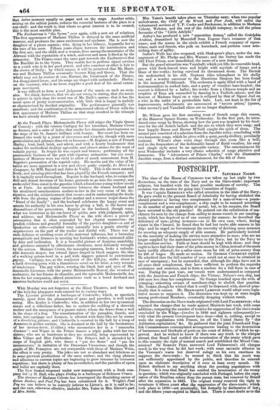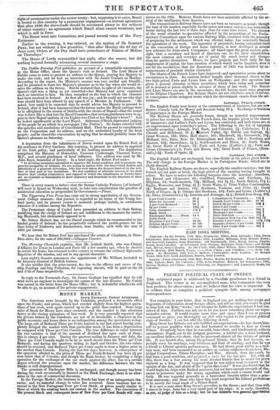POSTSCRIPT.
SATURDAY NIGHT,
The time of the House of Commons was taken up last night by two discussions, on the state of the Navy and on the Slave-trade; important subjects, but handled with the least possible modicum of novelty. The occasion was the motion for going into Committee of Supply.
It was Captain BERKELEY who called attention to the state of the Navy., He gave credit to the present Board of Admiralty for having abolished the absurd practice of having two complements for a man-of-war—a peace- complement and a war-complement: a ship ought to be manned according to its number of guns and weight of metal; but, to his surprise, the Board have reverted to the old practice! He pointed out the substitution of ma- chinery for men by the change from sailing to steam-vessels in our coasting- trade, which has deprived us of one nursery for seamen: he described the deficiency of men; giving instances—as in is own case, where, during winter in the Channel, he found that he had but twelve able seamen in his ship: and he urged on Government the necessity of devising some measure for securing an adequate supply of able seamen. He particularly insisted on the necessity of making the service more attractive to men; who are no longer supplied by the merchant-service to the Navy, but by the Navy to the merchant-service. Faith at least should be kept with them: and they ought to have had their share of the prize-money in China, instead of the mere batta tardily allowed; for a sailor cares more for 101. of prize-money than for 201. of wages. He made no motion. Sir GEORGE Coexnume replied. He admitted that the full number of men could not at once be obtained in case of emergency; but he contended, that although the ships have not in all cases their complement, they have sufficient to perform the requisite evolutions and exercises, and to form a nucleus for a full force in case of war. During the past wars, our vessels were undermanned as compared with the American and French ships; the Victory, Nelson's own ship, had 100 men less than her complement. Sir George touched upon the evils of crimping; exhorting owners of merchant-ships to abolish that practice. Mr. SOMES, though he wished that it could be dispensed with, showed prac- tically that it cannot. Mr. HEDWORTH LAMBTON would adopt some legis- lative means to suppress it. The discussion was kept up at some length among professional Members; eventually dropping without result.
The discussion on the Slave-trade originated with Lord PALMERSTON; who repeated the charges that he made against Ministers last week, with some addition; comparing the number of treaties for suppression of the slave-trade concluded by the Whigs—(twelve in 1830 and eighteen subsequently)— with what the present Government have done—that is, nothing, except to undo the negotiations with France, let off the United States fly " the Ashburton capitulation," &c. He gathered that the joint French and Eng- lish Commissioners contemplated arrangements leading to the destruction of barracoons and blockade of ports on the coast of Africa; of which he ap- proved. And he wished to know if there was any truth in the whisper abroad, that Brazil had notified the termination of the treaty which gave to this country the right of mutual search and established the Mixed Com- mission? Sir ROBERT PEEL answered Lord Palmerston's old charges much in the way that he did last week; with some sarcastic allusion to the Viscount's warm but deserved eulogy on his own exertions to suppress the slave-trade : he seemed to think that his merit was not sufficiently appreciated by the public, and therefore he entered upon an elaborate description of it once at least every month. Sir Robert declined to say anything about the pending negotiations with France. It is true that Brazil has notified the termination of the treaty in question; which was originally concluded with Portugal, before the sepa- ration of the Brazilian colony from the parent state, but renewed by Brazil after the separation in 1825. The original treaty reserved the right to terminate it fifteen years after the suppression of the slave-trade; which took place in 1830—not practically, but formally by declaration of law., and the fifteen years expired in March last. There is some doubt as to the right of terminationtthner the newer treaty: but, supposing it to exist, Brazil. is bound to this country by a permanent engagement—a mutual Agreement that after.1630 the slave-trade should be accounted piracy in the subjects of either country; an agreement which Brazil alone cannot terminate, and
which is still in force. The House went into Committee, and passed several votes of the Navy Estimates.
Earlier in the evening, it was ordered, on the motion of Sir ROBERT PEEL, but not without a few grumbles, "that after Monday the 2d day of June next, Orders of the Day shall have precedence of Notices of Motion vn Thirsdays."
The House of Lords reassembled last night, after the recess; but did nothing beyond formally advancing several measures a stage.



























 Previous page
Previous page